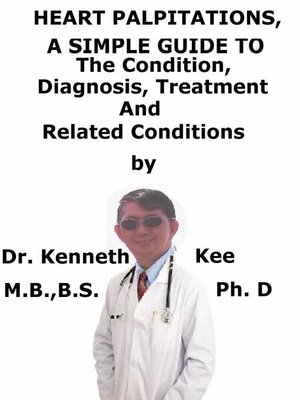Heart Palpitations, a Simple Guide to the Condition, Diagnosis, Treatment and Related Conditions
ebook
By Kenneth Kee

Sign up to save your library
With an OverDrive account, you can save your favorite libraries for at-a-glance information about availability. Find out more about OverDrive accounts.
Find this title in Libby, the library reading app by OverDrive.



Search for a digital library with this title
Title found at these libraries:
| Library Name | Distance |
|---|---|
| Loading... |
This book describes Heart Palpitations, Diagnosis and Treatment and Related Diseases
Heart Palpitations are feelings or sensations that the heart is rapidly pounding or racing.
The palpitations can be sensed in the chest, throat or neck.
These sensations have been felt by every human at one time or another.
People young and old may feel their heart thumping away as they watch a frightening movie and comes into contact with something fearful.
There may be strong emotional responses such as:
1. Stress,
2. Anxiety or
3. Panic attacks
4. Somatization disorders
5. Depression
6. Fear
7. Nightmares
Even excessive stimulants to heart rate in food or medicines can cause heart palpitations such as:
1. Strenuous exercise
2. Stimulants, including nicotine (smoking), cocaine, heroin, amphetamines
3. Cold and cough medicines that contain pseudoephedrine
4. Certain medicines such as those used to treat asthma, high blood pressure, or heart problems
5. Caffeine: cola, coffee, tea, Red Bull
6. Diet pills
7. Excess alcohol use
There may be Systemic Disorders such as:
1. Fever
2. Hormone changes associated with menstruation, pregnancy or menopause
3. Too much or to little thyroid hormone
4. Postural orthostatic hypotension syndrome.
5. Pheochromocytoma
6. Hypovolemia (Shock)
7. Dehydration
8. Electrolyte abnormalities (Abnormal blood level of potassium)
9. Low blood sugar
10. Anemia
11. Low levels of oxygen or carbon dioxide in the blood
12. Blood loss
Of course heart palpitations also occur in structural heart disease such as:
1. Valvular pathology: mitral valve prolapse, aortic or mitral regurgitation, mechanical valves.
2. Cardiomegaly or hyper-trophic cardiomyopathy
3. Congestive heart failure
4. Congenital heart disease
5. Ischemic heart Disease
Heart palpitations occur also in abnormal heart rhythm (arrhythmia) such as:
1. Very fast heart rate (tachycardia, fibrillations)
2. Abnormally slow heart rate (bradycardia, heart block)
3. Extra-systoles (ventricular or supra-ventricular)
4. Irregular heart rhythm (Wolff Parkinson White syndrome)
Heart Palpitations is a symptom that depicts the sensation that happens when a person can feel an abnormality in the normal beating and rhythm of the heart.
These palpitations may be a one-off extra beat or they can happen together and persist for prolonged periods of time.
The heart's rhythm can be normal or unusual when the patient has palpitations.
The heart beats normally 60 to 100 times per minute.
The heart rate may fall below 60 beats per minute in people who exercise regularly or take medicines that decrease the heart rate.
When the heart rate is fast (over 100 beats per minute), this is termed tachycardia.
A heart rate that is slower than 60 is termed bradycardia.
An occasional extra heartbeat is termed as extra systole.
These disorders make the patient more likely to have an abnormal heart rhythm:
1. Known heart disease
2. Significant risk factors for heart disease
3. An abnormal heart valve
4. An electrolyte abnormality in the blood such as a low potassium
Examination of the heart and an ECG will always help in the evaluation of palpitations when they are present.
Other tests such as holter monitor, echocardiogram, electrophysiology study are important to determine the heart's electrical function.
Unless the doctor determines that the patient have a heart disorder, heart palpitations have seldom need treatment.
If...







